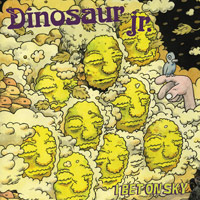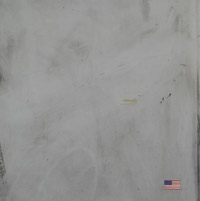
I Bet on Sky
Jagjaguwar
It no doubt seems a little cliche to say that it’s like they never broke up, but J Mascis, Lou Barlow and Murph—the original incarnation of Dinosaur Jr.—have now been back together longer than they lasted the first time around. And with I Bet on Sky, their new album, they have also now equalled the output of that initial run.
But that’s just the stats, and to use another cliche, you can never go home again. Still, if you close your eyes and let yourself get lost in the murk of stoner-punk songs like “Watch the Corners” and “What Was That,” it’s easy to forget the intervening years. Hell, there’s even a song on the record called “I Know It Oh So Well.” Mascis’ guitar still roars with equal parts grandeur and sludge, pulled from influences like Young and Ginn so many years before, while his bong-smoked vocals are equally slackjaw and plaintively compelling. His greatest talent has not been so much in stringing lyrics together, but in coming up with couplets that are impossible to shake, and such is the case here. On the aforementioned “Watch the Corners,” he sings, “In time there’s no forgiveness,” and though you don’t quite know what he means, it somehow rings true.
Barlow turns in two songs for the record, proving him still the pop foil to Mascis’ predilection to less structured forms (though he certainly he can write a hook too). “Rude” is like Paul Revere & the Raiders on amphetamine, a buoyant melody mussed with a rambunctious crunch, while “Recognition” is not unlike Sebadoh in its minor-keyed bounce, only bruised with Masic’s big guitar licks. There’s more than a few signs that Dinosaur Jr. has aged, but those are just matters of execution. The band still rages with youthful vigor where it matters, and that’s what really counts.
Stephen Slaybaugh

Sic Alps
Drag City
Here’s where the strings come in, quite literally in fact. “Glyphs,” the first song on Sic Alps’ fourth proper album, sounds cut directly from some Sgt. Pepper’s outtakes, with a string quartet lending a baroque psychedelic gild to the duo’s simple pop. Make no mistake, the fourth album from the San Francisco band is self-titled for a reason. It’s year zero for them, jumping into a sophistication one always expected, but for whatever reason (perhaps their steadfast commitment to econo-minimalism) was never delivered. That’s not to say each step hasn’t been on a forward path (check out the series of singles released over the past two years), but the formula was beginning to wear thin by the last side of the elongated Napa Asylum. In stark contrast, Sic Alps is a thrifty album, clocking in at around 30 minutes and thereby concentrating all of the vibrant color and new found sonic frills into a series of near-perfect melodious moments. Not a second is wasted nor a thought meditated upon for longer than it should.
Yet, despite all of the ornamentation, Sic Alps isn’t the band gunning for a wider audience. In the grand scheme, it’s not even much of a departure from their past output. There are still scruffy, ramshackle solos dirtying up the sunshine. Phrases are still slightly whispered, like secrets culled from the duo’s telekinetic language. And for the most part, the tunes are merely better planned and better executed echoes of U.S. EZ, which was up until now the quintessential Sic Alps record to own. But in those magical turns where Sic Alps do differentiate from the mean, it’s a glorious thing to behold. The sprightly shimmy of “God Bless Her, I Miss Her” and the straight ’60s love-in of “Moviehead” show the band’s real love exists in the ghosts of Beatles and Stones’ sides. This is just their interpretation of those reverberations, their take on that optimistic, all-together-now vibe, and it sounds effortless. Moving and majestic, by the time you arrive at the piano-led melancholy of “Rock Races” and the closer, “See You on the Slopes,” which is little more than a few notes on the ivory, voice and a finale of crashing waves, you begin to understand why it was wise to stick with Sic Alps through all of their various iterations and hiccups. You knew eventually it would lead to this. What a glorious sound to behold.
Kevin J. Elliott
MP3: “Glyphs”

Coexist
Young Turks/XL
The boy/girl vocals on Coexist take turns airing disengaged musings in real time. They never hear each other, which is a shame because they often say the same things. So much in fact, the occasional sentiment occurs in unison and we find their timbres match. This is by chance, an inadvertent by-product of having once been close, like ordering the same toppings on a pizza. Now besides the point, it becomes a futile agreement. Patterns of speech line up and everything is colloquial—from the language and brand of insight to their intonation, scantly more melodic than talking. This is all a modest allegory for the lyrical content: the mutual, yet distinct, grievance of the dissolution of a once sacred pact and the tragic irony in wanting and needing and saying something so parallel that acquiescence is impossible.
But unlike the pina colada song and its proto–M. Night Shymalan ending, Coexist does not feign resolution. Nothing mimics the arc of plot, yet it must be ingested as an album; individual songs do not fare well on their own. Formally resembling intros or transitions, they each walk the structural plank. It is fair to assume The XX would still be engaged in a Sisyphean cant of the first song they ever wrote if it weren’t for the fade-out and interrupted thought. So we read Coexist as a two-person, one-act play, Beckett does daytime, a downbeat one-liner. Narcotic basslines for the slo-mo club scene and reverb-laden guitars chime in with a bit of light, and it’s all somehow less punchy and more melodramatic than the widely acclaimed self-titled release of 2009. If it begs for supplement, it won’t be for long. We should all sit back and wait for the remixes to roll in or for a track to be placed over the moving pictures of another. Not that it isn’t pretty, but Coexist packs no punch of its own, just a reiteration of loss and confusion.
Elizabeth Murphy

Elysium
Astralwerks
Had the Pet Shop Boys called it a day after the release of Discography, their first singles compilation from 1991, they may have been considered one of the best pop groups of all-time. Instead, they continued, tainting their reputation so that they are relegated to either the one-hit wonder bin or being simply an ’80s band. That says more about perception than reality. The reality of the band is that they have sold more than 100 million records worldwide and are listed as the most successful duo in UK music history by The Guinness Book of Records. They’ve also been consistently productive for nearly three decades years; while the American spotlight may have shifted elsewhere, the band has continued to flourish. Now in their 28th year the duo has released their 11th studio album, Elysium.
While the Pet Shop have tweaked their sound at various points in their career, sonically they have always been built on a foundation of synth-pop and frontman Neil Tennant’s detached vocals. Elysium doesn’t do much to shake up that formula, but the album does bring in the production work of Andrew Dawson, who has previously specialized in hip-hop. Dawson was sought out for his work on Kanye West’s 808s & Heartbreak, and that record’s influence is fairly obvious. Where it comes through is mainly in the sparseness and treatment of the drums. As a result, it’s not the dancefloor-friendly record that is usually associated with the band.
Large patches of Elysium are focused on the aspect of fading away rather than burning out. The fear is clear on a couple fronts: in a romantic sense (“Leaving”) and professionally (the hilariously uncomfortable “Your Early Stuff”). The whole record may be a study in aging and what that means, and it showcase some of the band’s best work. “Ego Music,” however, is a one-joke, one-note skewering of self-obsessed, navel-gazing musicians. It’s not the idea but the flat-footed execution that makes it a skipper. While Elysium may not always hit the great heights of which the band is capable, it shows that there is still plenty of life left in the Pet Shop Boys.
Dorian S. Ham

Kill My Blues
Kill Rock Stars
This is the second long-player from the the Corin Tucker Band, and it is decidedly not a “middle-aged mom record” like Tucker described the first, 1,000 Years. Frankly, both albums are very straightforward rock records, obviously played by experienced musicians skilled in their craft. Understandably, as a musician grows, that experience and skill can erode the edge of keen young players trying to make something new and fresh. In relation to this erosion, Kill My Blues is a step backwards compared to 1,000 Years. This is not a bad thing. While part of me wanted to love every song because of Sara Lund’s involvement, I wasn’t all that excited about the project at first listen. With Kill My Blues, though, that sharp edge I’d come to expect from Tucker’s guitar and vocals—starting with Heavens to Betsy and continuing with Sleater-Kinney—is ever-present and unavoidable. The band members are comfortable playing with each other, clearly, and instead of trying hard to make the new band sound a certain way, they’ve settled into making it the sum of all its parts. I recognize some deceptively complex Lund-isms on the drums, especially on the title track and the mid-tempo “Joey,” where she may have actually grown another arm or somehow dis-coordinated her bass drum foot. There wasn’t much of that on the first record, nor was there much of Tucker’s trademark wacked-out vocal vibrato. Fortunately, there’s enough on Kill My Blues that I’m happy to report it sounds like a goddamn riot grrl band.
The opener, “Groundhog Day,” is a WTF screed aimed at the lack of motivational drive that the third wave feminist movement has had for the last 10 years. “Almost good enough,” Tucker sings. “Almost had a woman go and run the White House... What are we missing, how can we move on?” She doesn’t offer answers; she leaves that up to the listener. The production of the record is a little roomier, a little more live, and much more raw than that of it predecessor. This sounds like a live band just blasting through their set, and it’s just as fun. Maybe this is as close as we’re going to get to a new Sleater-Kinney album or maybe the next sounds we’ll hear from the Corin Tucker Band will be on par with a classic like Dig Me Out. If they keep traveling along the same path, I want to hear more.
Michael P. O’Shaughnessy
ALBUM REVIEWS
Jens Lekman, I Know What Love Isn't
Neil Halstead, Palindrone Hunches
Gallon Drunk, The Road Gets Darker from Here
Richard Hawley, Standing at the Sky's Edge
Divine Fits, A Thing Called Divine Fits
Dan Deacon, America
Ariel Pink's Haunted Graffiti, Mature Themes
Wild Nothing, Nocturne
Teen, In Limbo
Bill Fay, Life Is People
Maximo Park, The National Health
Six Organs of Admittance, Ascent
Adrian Sherwood, Survival & Resistance
Bailterspace, Strobosphere
